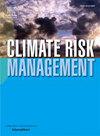Measuring community heatwave resilience: A comprehensive framework and tool
IF 5
2区 环境科学与生态学
Q1 ENVIRONMENTAL SCIENCES
引用次数: 0
Abstract
This article presents the first comprehensive, multi-sector heatwave resilience measurement framework and associated tool, available for use at the community or city neighbourhood scale. The question of how to live in a rapidly urbanising, climate change impacted world with more frequent and intense heatwaves is more urgent than ever. Most cities and communities around the world are critically underprepared for the growing reality of heatwaves. This paper presents the system of systems that come together to generate heatwave risk and action in which can, in-turn, support community-level heatwave resilience: features of urban heatwave risk, heatwave vulnerabilities, and heatwave governance. We then present the heatwave version of the Climate Resilience Measurement for Communities: a systems-based approach for conceptualising and measuring disaster resilience. The framework was co-designed by researchers and practitioners and is based on the most widely applied community flood resilience measurement endeavor in the world. This is, to our knowledge, the only standardized and holistic, yet globally applicable, heatwave resilience measurement framework available.
衡量社区抗热浪能力:综合框架和工具
本文介绍了首个全面的多部门热浪复原力测量框架和相关工具,可在社区或城市街区范围内使用。在一个快速城市化、受气候变化影响、热浪更加频繁和剧烈的世界里,如何生活的问题比以往任何时候都更加紧迫。世界上大多数城市和社区对日益严重的热浪现实准备严重不足。本文介绍了共同产生热浪风险和行动的系统体系,这些体系反过来可以支持社区层面的热浪抗御能力:城市热浪风险特征、热浪脆弱性和热浪治理。然后,我们介绍了热浪版本的 "社区气候复原力测量":一种基于系统的方法,用于概念化和测量灾害复原力。该框架由研究人员和从业人员共同设计,以世界上应用最广泛的社区抗洪能力测量工作为基础。据我们所知,这是目前唯一一个标准化的、全面的、全球适用的热浪抗灾能力衡量框架。
本文章由计算机程序翻译,如有差异,请以英文原文为准。
求助全文
约1分钟内获得全文
求助全文
来源期刊

Climate Risk Management
Earth and Planetary Sciences-Atmospheric Science
CiteScore
8.20
自引率
4.50%
发文量
76
审稿时长
30 weeks
期刊介绍:
Climate Risk Management publishes original scientific contributions, state-of-the-art reviews and reports of practical experience on the use of knowledge and information regarding the consequences of climate variability and climate change in decision and policy making on climate change responses from the near- to long-term.
The concept of climate risk management refers to activities and methods that are used by individuals, organizations, and institutions to facilitate climate-resilient decision-making. Its objective is to promote sustainable development by maximizing the beneficial impacts of climate change responses and minimizing negative impacts across the full spectrum of geographies and sectors that are potentially affected by the changing climate.
 求助内容:
求助内容: 应助结果提醒方式:
应助结果提醒方式:


